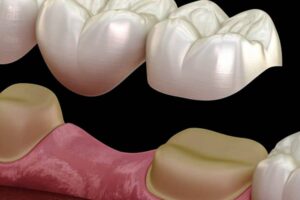Composite Fillings

For the purpose of restoring a tooth that has been damaged by decay, cracks, fractures, etc., a composite (tooth-colored) filling is employed. After removing the decayed or damaged area of the tooth, a composite filling will be placed in its place.
There are numerous varieties of filling materials available, each with unique benefits and drawbacks. You can talk about your best options for tooth restoration with your dentist. The two types of fillings that are nowdays most frequently utilized are composite and silver amalgam. Composite fillings are more visually appropriate for use in front teeth or other exposed portions of the teeth since they may be carefully matched to the color of existing teeth thanks to their tooth color.
Composite fillings are not permanent, like the majority of dental restorations, and may eventually need to be changed. They are quite durable and could last for many years, but in other situations when the filing is more extensive, porcelain might be a better, more durable option.
Reasons for composite fillings:
- Cracked teeth
- Closing space between two teeth
- Damaged or chipped teeth
- Teeth are decayed
- Worn teeth
How are composite fillings placed?
Composite fillings are typically installed in one visit. Your dentist will treat any decay if necessary, while the tooth is numb. After that, the area will be meticulously cleaned and ready for the new filling. For further protection, a specific drug will be administered if the decay occurs close to the tooth's nerve. Your tooth's shape and function will then be exactly restored by carefully positioning, shaping, and polishing the composite filling.
When composite fillings are first placed, it is common to feel sensitivity to heat and cold, however this sensitivity will soon go away as your tooth becomes used to the new filling.
At the end of your treatment, care instructions will be given to you.
Your new fillings will last longer if you practice good oral hygiene, make healthy food choices, and visit the dentist on a regular basis.






